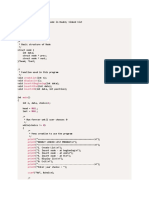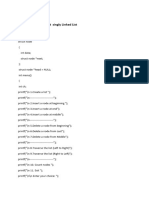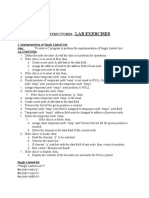0% found this document useful (0 votes)
16 views32 pagesPractical+Algorithm of Singly Linkedlist
The document provides a comprehensive guide on implementing various linked list operations in C, including insertion at the head, tail, specific positions, and in sorted order. It also covers deletion operations such as removing from the head, tail, a specific position, and by value. Each function is accompanied by its algorithm and a complete program structure for managing a singly linked list.
Uploaded by
M.t GamingCopyright
© © All Rights Reserved
We take content rights seriously. If you suspect this is your content, claim it here.
Available Formats
Download as PDF, TXT or read online on Scribd
0% found this document useful (0 votes)
16 views32 pagesPractical+Algorithm of Singly Linkedlist
The document provides a comprehensive guide on implementing various linked list operations in C, including insertion at the head, tail, specific positions, and in sorted order. It also covers deletion operations such as removing from the head, tail, a specific position, and by value. Each function is accompanied by its algorithm and a complete program structure for managing a singly linked list.
Uploaded by
M.t GamingCopyright
© © All Rights Reserved
We take content rights seriously. If you suspect this is your content, claim it here.
Available Formats
Download as PDF, TXT or read online on Scribd
/ 32






















































































